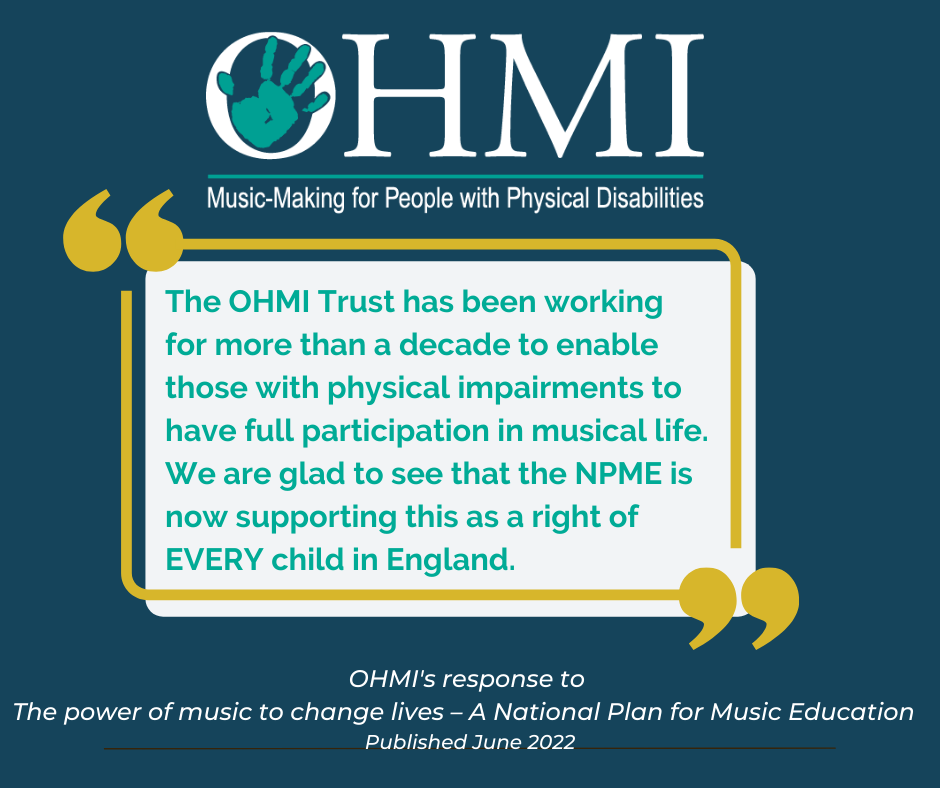|
We are delighted that, in ‘The power of music to change lives – A National Plan for Music Education’ (NPME: Published June 2022), the Government sets out a clear ambition to level up musical opportunities, regardless of a child’s circumstance. The expressed commitment to be more truly inclusive is very welcome and long overdue.
OHMI applauds the Government’s suggestion that schools include in their equality objectives (which they have to publish under the Equality Act 2010), a greater inclusion of pupils with SEND in the school’s musical life. It is encouraging news for the millions of children in the UK who live with a disability and who – in most instances – are denied or given only restricted access to the joy of music-making. It also builds on OHMI’s work with a number of music hubs; which has long been the perfect showcase for what can be achieved when partners work together to put in place an appropriate action plan. How the NPME will benefit SEND pupils The three goals of the refreshed NPME are:
The NPME recognises that, for pupils with additional needs, some aspects of teaching, learning and performance are bound to be different; but there should be absolutely no compromise on the quality of provision. Quality provision, of course, means matching the pupil with the most appropriate support – not necessarily on the instrument they can apparently play; rather the instrument they want to play. This is often denied because of two key barriers:
The OHMI Trust has a proven track record of helping overcome both of these obstacles: (1) Lack of awareness That all pupils should be offered the opportunity to learn an instrument through Whole-Class Ensemble Teaching (WCET) was a key objective of the original NPME in 2011. However, when it comes to WCET, pupils with identified additional needs, or barriers to learning, are frequently left to struggle with their own individual obstacles. Without the right equipment, they therefore receive a poorer quality experience compared to their classmates. It is often the case that the visiting music hub teacher is unaware of any additional needs because schools are not routinely passing on information that could help hubs make appropriate provision for each pupil. That, in turn, is often down to a lack of awareness on the part of the school – either in terms of identifying in good time that a particular student may struggle without an adapted instrument; or, indeed, in knowing that adapted instruments actually exist! (2) Availability of affordable instruments Adapted instruments and supportive apparatus are not familiar to many teachers, can be very expensive, and are not yet routinely available in hubs and schools. Both OHMI and the Music Hubs therefore have a part to play in helping schools source the best instruments for their pupils at an affordable cost. OHMI’s Instrument Hire Scheme seeks to do just that; offering a range of adapted instruments as well as stands and apparatus to allow the instruments to be fully playable with a range of impairments. Some 142 adapted instruments and 165 pieces of enabling apparatus are included in the scheme, including left- and right-handed recorders, flutes and brass instrument stands, and less familiar instruments such as the Artiphon. Overcoming obstacles to inclusive practice Working with our partners Creative United, Nottingham Music Service, NMPAT and Services for Education, OHMI has helped find workable solutions to improve equality of access to music-making in WCET. It has done so through its Inclusive Access to Music-Making Programme (IAMM), which identifies barriers to music-making by surveying the population of children before they embark on WCET, putting in place mitigating measures wherever possible. Research commissioned by OHMI and carried out by Birmingham City University this year, identified that nearly half (49%) of the 283 IAMM participating schools identified young people who may experience barriers to learning a musical instrument in WCET classes. Without the IAMM programme these pupils would have felt excluded from access to WCET, and their enjoyment of music-making denied. The schools studied in this project were typical of all schools everywhere, and their pupil populations are representative of all others. IAMM is therefore uncovering a previously hidden population of pupils who are denied proper access to music, and the NPME makes it clear that we must strive to redress that balance. An expansion of IAMM to other areas is already underway, but, if we are to be truly inclusive, its provision should not be a postcode lottery but should be available nationwide. Through its NPME, Government has made it clear that each Music Hub is expected to develop and publish an inclusion strategy. OHMI’s support in helping to identify and assess pupils needs, and source instruments and equipment to give greater equity of access for those with many commonly found conditions, has never been more important. Learn more about OHMI’s participation in the IAMM project here. Comments are closed.
|
CategoriesArchives
June 2024
|


 RSS Feed
RSS Feed
